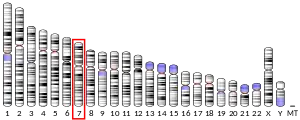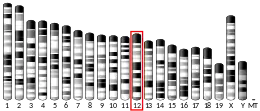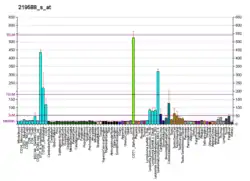NCAPG2
Condensin-2 complex subunit G2 (CAP-G2) also known as chromosome-associated protein G2 (CAP-G2) or leucine zipper protein 5 (LUZP5) is a protein that in humans is encoded by the NCAPG2 gene.[5][6] CAP-G2 is a subunit of condensin II, a large protein complex involved in chromosome condensation. It interacts with PLK1 through its C-terminal region during mitosis[7]
Clinical importance
Mutations in this gene in humans have been associated with severe neurodevelopmental defects, failure to thrive, ocular abnormalities, and defects in urogenital and limb morphogenesis.[8]
References
- GRCh38: Ensembl release 89: ENSG00000146918 - Ensembl, May 2017
- GRCm38: Ensembl release 89: ENSMUSG00000042029 - Ensembl, May 2017
- "Human PubMed Reference:". National Center for Biotechnology Information, U.S. National Library of Medicine.
- "Mouse PubMed Reference:". National Center for Biotechnology Information, U.S. National Library of Medicine.
- Ono T, Losada A, Hirano M, Myers MP, Neuwald AF, Hirano T (October 2003). "Differential contributions of condensin I and condensin II to mitotic chromosome architecture in vertebrate cells". Cell. 115 (1): 109–21. doi:10.1016/S0092-8674(03)00724-4. PMID 14532007. S2CID 18811084.
- "Entrez Gene: NCAPG2 non-SMC condensin II complex, subunit G2".
- Kim JH, Shim J, Ji MJ, Jung Y, Bong SM, Jang YJ, Yoon EK, Lee SJ, Kim KG, Kim YH, Lee C, Lee BI, Kim KT (August 2014). "The condensin component NCAPG2 regulates microtubule-kinetochore attachment through recruitment of Polo-like kinase 1 to kinetochores". Nature Communications. 5: 4588. Bibcode:2014NatCo...5.4588K. doi:10.1038/ncomms5588. PMID 25109385.
- Khan TN, Khan K, Sadeghpour A, Reynolds H, Perilla Y, McDonald MT, Gallentine WB, Baig SM, Davis EE, Katsanis N, et al. (Task Force for Neonatal Genomics) (January 2019). "Mutations in NCAPG2 Cause a Severe Neurodevelopmental Syndrome that Expands the Phenotypic Spectrum of Condensinopathies". American Journal of Human Genetics. 104 (1): 94–111. doi:10.1016/j.ajhg.2018.11.017. PMC 6323578. PMID 30609410.
Further reading
- Smith ED, Xu Y, Tomson BN, Leung CG, Fujiwara Y, Orkin SH, Crispino JD (February 2004). "More than blood, a novel gene required for mammalian postimplantation development". Molecular and Cellular Biology. 24 (3): 1168–73. doi:10.1128/MCB.24.3.1168-1173.2004. PMC 321451. PMID 14729962.
- Nousiainen M, Silljé HH, Sauer G, Nigg EA, Körner R (April 2006). "Phosphoproteome analysis of the human mitotic spindle". Proceedings of the National Academy of Sciences of the United States of America. 103 (14): 5391–6. Bibcode:2006PNAS..103.5391N. doi:10.1073/pnas.0507066103. PMC 1459365. PMID 16565220.
This article is issued from Wikipedia. The text is licensed under Creative Commons - Attribution - Sharealike. Additional terms may apply for the media files.




